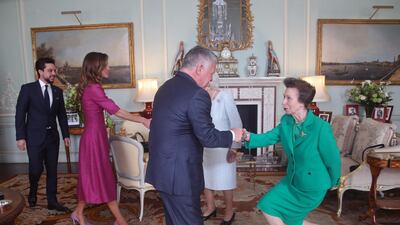Jordan called for support for its reform programme and vowed to focus on developing its energy sector as it looks to move on from a decade of “crisis management”, according to Omar Razzaz, the prime minister.
“As difficult as the past decade was, we did deepen our resilience, perseverance and growth. We will continue to make bread and share it as we did 14,000 years ago but also bring privately-provided public goods, business services, green solutions,” he told a London audience.
The prime minister was speaking at a UK-led conference focused on promoting Jordanian growth and economic opportunities. Mr Razzaz was speaking at a meeting designed to provide support as it embarks on a controversial IMF reform programme that has been adopted amid sporadic protests in recent months.
On Thursday the UK government announced it would assist some 200,000 young Jordanians learn English and help train 6,000 English language teachers as part of a package to equip them with job skills and improve employment.
With Jordan hosting roughly 670,000 registered Syrian refugees, the UK said it would “help lessen the burden” by providing them with money to buy food, clothes and other essentials. Western and Arab allies lined up at the central London meeting to boost the host’s pledges.
Speaking on the Syrian refugee crisis, Mr Razzaz said the impact on his country’s infrastructure was “tremendous”.
“King Abdullah warned that Jordan had reached boiling point. In our characteristically resolute, inventive and constructive way, we in Jordan have managed to stabilise our situation and carry on in doing good, serving our citizens and including all refugees in our health, education and labour market.”
The prime minster took an optimistic tone throughout his speech, saying that he now sees energy “as part of the solution rather than part of the problem”, and adding that Jordan is now well positioned for further investment and growth.
“We see energy as part of the solution instead of part of the problem which we had done in the last decade. It is now the time to move forward from crisis management, that we had to do in the last decade, to growth and opportunity realisation by working together with old friends and new partners.”
His forward thinking was echoed by minister of state for investment affairs, Muhannad Shehadeh, who cited Jordan’s innovative IT sector as evidence of the country’s modern outlook. According to the minister, 23 per cent of graduates major in ICT with 51 per cent women. “So technically that sector is a pool of endless innovators.”
“The potential is massive; Jordan has the talent, we have what it takes. What’s missing is investors, market accessibility and mentors.
“We understand that for us to attract investment, we have to have the right environment as well as having the right projects. My message is, we know we are in the right direction. We are committed to creating a better environment for business to thrive in Jordan,” said Mr Shehadeh.
Jordan is looking to grow by aggressively increasing exports and foreign direct investment, as well promoting a more environmentally-friendly economy and reducing production costs. The minister said Jordan had seen a 3.6 per cent increase in exports in 2018 – “pretty significant considering the regional difficulties”.
In mid-January, Egypt signed an agreement to supply Jordan half of its daily need of natural gas for the production of electricity to help reduce energy costs.
Also speaking at the conference, Minister Agnes Pannier-Runacher, France’s Secretary of State to the Minister of Economy and Finance, announced that France would sign a memorandum of understanding for a financing package of €1 billion (Dh4.18 billion) for 2019-2022, combining concessional loans and grants.

